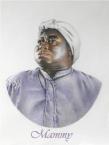I was driving on the freeway and an 18-wheeler speeding next to me lost control of his rig and headed toward me. I kept driving. I didn’t slam on my brakes or turn away from the truck. I kept driving straight in my lane as the 18-wheeler was coming into my lane.
I fell apart.
I didn’t think about my baby, my husband, my mother. Not my father, my sister, nor my brother. I didn’t wonder about friends, my students, my church. I just wanted the truck to hit me, to kill me. I just wanted to be with Jesus.
This wasn’t the first time I fell apart. There was the time when I snapped at my husband for turning the light on so I could see. Then there were the times of bursting in tears and staring in space with periodic screams to fill the silence. I would rock back and forth while sitting on the edge of my bed or walk aimlessly around the house.
I fell apart.
I fell apart at these times, but the 18-wheeler time was different. This time I was beyond despair. My depression had gone from tears to tainted thoughts of a different life, the afterlife, one away from the pressures of life. One with Jesus.
I had never been suicidal before, at least not since my teen years. After the 18-wheeler regained control of his truck I returned to normal: I burst into tears, stared into space and screamed periodically. I wondered how I—a Christian, wife, mother, college professor, church leader, daughter, sister, friend, counselor, had gotten here. How had I gone so far as to want to kill myself?
I had a “perfect” life: A wonderful husband, a precocious little boy, a tenured job, leadership positions at my church and lots of friends. I was a writer who enjoyed scripting and presenting poetry. How had I gone so far? I had a wonderful, full life. Why did I want to kill myself?
Maybe the answer seems clear: My life was too full, weighing me down until I felt I could no longer go on. I had too much going on in my life; I was trying to be too much for too many people. I was taking on assignments and not completing them well. I was forgetting appointments, staying up late and getting up early. I was driving all over town to meet obligations and had a host of stress-related issues to tend to. The pressure was tough, but I felt I had to do it. This was my life. This was my lot. I was falling apart from the pressure of being a strong black woman.
Copyright 2006-2010 by Rhonda J. Smith


